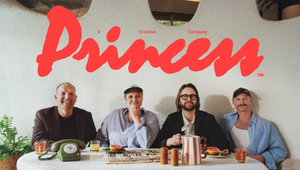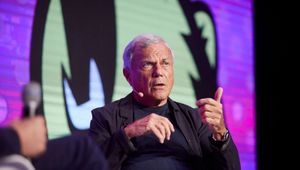
Making the Pared-Back Charity Campaign that Brought Ben Priest Back to Advertising

“When Ben Priest calls, you answer the phone and you say yes,” says Billy Boyd Cape. As a director represented by the UK production company Academy Films, he’s used to getting calls from agencies with scripts. He’s not used to receiving scripts directly from a co-founder of a generation-defining creative agency. Let alone one who’s been out of the industry for over four years.
Billy was on holiday for a wedding in Majorca at the time when Medb Riordan, managing director of Academy, called: ‘I'm going to send you a script. You should say yes. There's no money. It's really good.’ When Billy heard it was Ben’s idea, that emphatic position made sense.
Ben, one of the four co-founders of hot shop adam&eve (which later became ‘the John Lewis agency’ that is the iconic adam&eveDDB) had been fully out of the advertising game since his departure in 2018. “I've been spending as much time as possible with my family, going off into the middle of nowhere, going fishing and spending nights out in the countryside, playing a bit of golf,” he says. When he’s helped advertising friends with advice here and there, it’s been informally.
“I really wanted to just leave the business,” he says. “You're in it or you're not. And if you're in it, you've got to be in it 24 hours a day and eyes bulging. It's not something you can do half-heartedly. I'd done it for 30 years and loved it, loved it, loved it. But I found my brain straying to what would be a different way of life and I've embraced that.”
This campaign for a group of leading anti-slavery charities in the UK is his first return to advertising in four years. Centring around a brace of emotionally arresting films, with plenty of supporting creative collateral, it conveys a message around the estimated over 100,000 victims of modern slavery in the UK. The crime
is said to be hidden in plain sight, with the general public not aware of how to spot exploitation, but this campaign hopes to help to change that.
Ben and his wife have been involved with Justice and Care – one of the charities in the Coalition to Stop Slavery – over the last three years in various different capacities, helping and advising them. “It's a charity that we really fell in love with,” he says. “It's small but it does amazing things.”
Knowing Ben’s background, they contacted him about a year ago with an idea to try and pull every charity in this space together to do something that would make a special impact. For a lot of charities it's a difficult time. “When people are enduring their own hardship, I think that the part of their brain that thinks about other people less fortunate than themselves inevitably shuts down a bit,” says Ben. “Currently, whatever your politics, everyone's cash is going down and the price of everything is going up. We've got pipelines being blown up and countries invaded and annexed. It's a pretty bleak time and what we can't forget in this time is that there are other people – in this case on our doorstep – going through really difficult things.”
Ben didn’t take much convincing to come out of retirement, Rocky style, to create a campaign for the coalition.
The beginning of his idea was a moment that’s etched in his memory from years ago, when he was driving to work in Victoria, London. “It was rush hour, wall-to-wall traffic. And a young girl, naked, running for her life, ran down the road. It's one of the most shocking things I've ever seen in my life,” says Ben. “She was clearly running away from some sort of awful sexual exploitation situation. And the thing is that it's one of those issues that's happening all around us in every town in this country, within a mile of everyone's home.”
He started to assemble his team. He contacted a couple of Brazilian creatives he’s friendly with who after hours “like to do some things that do some good”. So Marcelo Conde and Eiji Kozaka joined Ben to help develop the idea that slavery is so close to us in our everyday lives, but how it’s made invisible to those who aren’t informed about it.
One of the scripts featured labour exploitation at a car wah, the other sexual exploitation at a club — two common forms of slavery in the UK.
Billy was the perfect choice to direct them. “As well as a lot of talent he's got a good heart,” explains Ben. But without the agency leviathan he was used to being behind him, the process was a lot more direct. “It was really embarrassing. I didn't have a producer for the first time,” says Ben. As one of the most famous creative leaders in London, suddenly he’s calling Academy Films and asking if Billy Boyd Cape would like to look at his scripts.
“In leaving advertising, I wanted to see what my life would be like without all of that, what kind of person I would be and how I would navigate that. Christ, I wasn't in the Stones. But you know, there is an element of that. And it was really nice not to have that and just ring a great company and send them two pieces of paper and then suddenly you've got a meeting with a great director.”
When the script came to him, Billy saw that Ben and the creatives had already done “the hard work of reducing it to this really powerful, simple idea that could be conveyed very quickly. Which is clearly what three decades in the industry has done,” says the director. “That's the hardest thing. It's very rare that a good idea comes along that can be described really simply and is really powerful.”
From there, the filmmaking process was just as direct. Ben, Billy and Jamie Fyleman from Justice and Care worked closely to develop the scripts into finished pieces of cinema, speaking openly and trying to be aware of what the films needed to say and how they’d say it.
“What I thought was most powerful about the very core idea was that so much in this category, subject matter is highly emotional,” says Billy. “It dramatises the people who are suffering and makes people feel empathetic towards them. What was brilliant about this is it's much more thought provoking. It challenges you on a different level. It makes you think and it stays with you.”
The director modestly credits Ben’s idea for this, but his filmmaking decisions were key of course. Ben loved Billy's vision to make it a journey through the car wash and the club from a single-shot, first-person view, as well as how we see everyone, but we can never really see anyone. “That's actually what we live,” he says. “When I go to the car wash I see those people. I don't really see what they are. They're all slightly faceless.” He notes the moment when the man who runs the car wash walks towards you and taps the bonnet in “that ominous way”. “Those are the really smart things that Billy brought to it that didn't get in the way. They added to it rather than scream ‘look at us, aren't we clever?’ They make the films feel very ominous and I think that's the beauty of the direction.”
Something Billy clung to in his direction was the insight that everything about slavery is invisible. It's about something that you can't see but is very and often very close by. “That was the metaphor that we're trying to communicate in the first half of both films,” he says. “You think you know where you are and that you know everything around you, but there's something slightly off. And it's the fact that everything's anonymous and you can't actually quite see anything makes you slightly unsettled, just enough for that ending to actually have a payoff when you understand it.
“That was something that was very core when I first heard the idea. It's all about feeling relatable. Both films begin and you feel like you know where you are. And then there's a few things that might trip you up on that or make you question it. It's also this idea of doing it as one shot and we're not letting you look away. You're looking around you can't quite see things but you are stuck in that world. And both are claustrophobic spaces, which you want to be pulled out of. And you get a sense of relief when you leave.”
But at that moment of relief, the reality is revealed. “You're suddenly confronted with these signs that give you the uncomfortable truth,” says Ben. “So even in your moment of escape you're given the truth of what the members of staff in this establishment are going through.”
Everyone wanting to be part of an important project like this meant that many of the constraints of regular commercial work were swerved. Billy namechecks the whole list of crew from the DOP to the 1st AD to the steadicam operator. “It was just a really top team.” And they had a day to shoot each film. “We spent all day just refining that one shot. We'd watch the take, get to maybe take six and you're starting to feel it's good. And then we just spent the rest of the day improving it. It's something that you very rarely get to do, just refining something really creative. It wasn't about hitting storyboards. Ben, Jamie and I would discuss after every take what we could improve. Normally you have three takes and you move on, or you're just recreating a storyboard. And this really wasn't that.Which is why it feels refined and cinematic, without hopefully feeling too clean. Lots of the ideas that we had in the treatment stage of what we might see got thrown out because you realise you don't need to see that.”
Ben remembers that certain moments stuck out as “flashing beacons of falseness or unnaturalness” when they played them back. They trimmed those, “paring it and paring it and getting the timings right”
Each of the films ends with the line “It’s never this obvious,” the purpose being to provoke people to look out for the less obvious signs of modern slavery. The Coalition to Stop Slavery website https://coalitiontostopslavery.org/ provides that education, as well as what to do if you suspect people are being exploited like this.

[Billy Boyd Cape and Ben Priest on set]
After four years away, the adam&eve co-founder has enjoyed being back in the game, albeit momentarily.
“I think towards the end I'd kind of had enough of advertising and needed a break. To come back for this sort of campaign and to end up working with all of these great people, and all of them giving their time and their expertise for free, has been a really lovely reminder of what a fabulous business it can be. So it's been a very sweet moment for me.
“But I'm not looking to get back into advertising. I never was. It took about 18 months to get used to it but I'm now completely used to that. And it's been lovely to circle back and just dip my toe in again.”
Along with the films, the team have made signs for all sorts of different businesses, including fast fashion and trawler fishing. Now the campaign has launched, all of the charities involved will be using their social media feeds to push those, as well as the films. Media partnerships with broadcasters will lead to programmes about the issue of modern slavery, with this campaign as a springboard. Each of the charities has celebrities that are connected to them, who together will help the push. And they’re also all speaking to politicians and journalists to try to use the momentum. As Ben sees it, “The films are a kind of flair, a way to say, ‘Look at this - this is the issue.’
This is the start of something that could shift awareness on slavery in the UK today and Ben’s been glad to be involved. “It's great to have the muscle of all of the different charities together. And it's been a fabulous thing to work on. We hope we can really begin to rattle some cages.”















